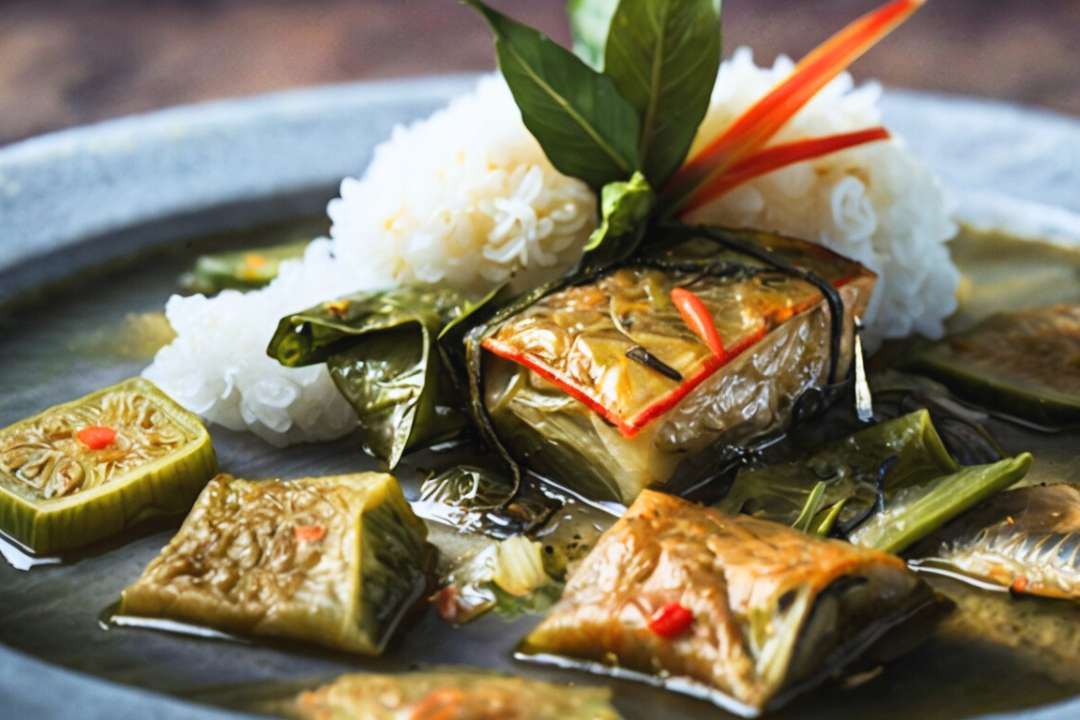The Secret to Perfect Fish Amok: Cambodia’s Most Delicious and Creamy Curry Revealed!
Discover the mouthwatering recipe that turns your kitchen into a Cambodian culinary haven with creamy, spiced fish Amok!

Recipe Index
- Fish Amok
- Lok Lak (Stir-fried Beef)
- Nom Banh Chok (Khmer Noodles)
- Samlor Korko (Stirring Pot Soup)
- Beef Saraman Curry
- Char Kroeung Sach Ko (Stir-fried Lemongrass Beef)
- Bai Sach Chrouk (Pork and Rice)
- Kuy Teav (Noodle Soup)
- Prahok Ktis (Pork and Coconut Dip)
- Num Ansom Chek (Banana Sticky Rice Cake)
- Lap Khmer (Lime-marinated Khmer Beef Salad)
- Char Kdav (Caramelized Palm Sugar Chicken)
- Maam Snoul (Fermented Fish)
- Nom Kong (Khmer Donuts)
- Twa Ko (Khmer Sausage)
Fish Amok (អាម៉ុកត្រី)
Overview
Fish Amok is a sublime fish curry, often considered the national dish of Cambodia. This aromatic curry is traditionally steamed in banana leaves, creating a mousse-like texture that’s both delicate and complex in flavor.
Cultural Significance
Fish Amok exemplifies the sophistication of Khmer cuisine, blending the abundant freshwater fish of the Tonle Sap with a harmony of local herbs and spices. Its roots can be traced back to the ancient Khmer Empire, showcasing the enduring legacy of Cambodian culinary traditions.
When It’s Eaten
While popular year-round, Fish Amok is often prepared for special occasions and festivals. In Siem Reap, it’s a must-try dish for visitors seeking an authentic taste of Cambodia.
Key Information
- Preparation Time: 30 minutes
- Cooking Time: 20 minutes
- Total Time: 50 minutes
- Difficulty Level: Medium
- Servings: 4
Ingredients
- 500g white fish fillet (such as snakehead fish or catfish)
- 400ml coconut milk
- 2 tbsp fish sauce
- 1 tbsp palm sugar
- 2 kaffir lime leaves, finely sliced
- 1 egg (optional, for a firmer texture)
- 2 tbsp kroeung (Khmer spice paste)
Kroeung (Khmer Spice Paste):
- 2 stalks lemongrass, finely sliced
- 3 kaffir lime leaves, stems removed
- 2 cloves garlic
- 1 shallot
- 2cm piece galangal
- 1 tsp turmeric powder
- 2 red chilies (adjust to taste)
Notes on Ingredients
- Fresh ingredients can be found at the Old Market or Psar Chas in Siem Reap.
- If snakehead fish is unavailable, firm white fish like cod or halibut can be substituted.
- Palm sugar can be replaced with brown sugar if necessary.
Instructions
- Prepare the kroeung:
- Finely chop all kroeung ingredients.
- Pound in a mortar and pestle until a smooth paste forms.
- Tip: Prepare extra kroeung and freeze for future use.
- Marinate the fish:
- Cut the fish into 2-inch cubes.
- Mix with 1 tbsp of kroeung and 1 tbsp of coconut milk.
- Let marinate for 15 minutes.
- Prepare the curry base:
- In a bowl, mix remaining kroeung, coconut milk, fish sauce, and palm sugar.
- If using, beat the egg and add to the mixture.
- Tip: Taste and adjust seasonings. The flavor should be a balance of salty, sweet, and umami.
- Cook the amok:
- Traditional method: Line a banana leaf bowl with spinach leaves, add the fish and curry mixture, and steam for 15-20 minutes until set.
- Modern alternative: Use ramekins or a heat-proof bowl and steam in a regular steamer.
- Tip: The amok is done when it’s slightly firm but still moist.
- Garnish and serve:
- Top with sliced kaffir lime leaves and red chili.
- Optionally, drizzle with a little coconut cream for extra richness.
Serving Suggestions
- Traditionally served in its banana leaf container.
- Accompany with steamed rice and a side of fresh vegetables.
- For an authentic experience, eat with your right hand, using rice to scoop up the curry.
Beverage Pairings
- Non-alcoholic: Fresh coconut water or a cold glass of sugar cane juice.
- Alcoholic: A crisp Sauvignon Blanc or a light Cambodian beer like Angkor.
Nutritional Information
- Calories: Approximately 300 per serving
- Protein: 25g
- Carbs: 10g
- Fats: 20g
- Rich in omega-3 fatty acids and vitamins from fresh herbs
Variations
- Some regions add small cubes of prahok (fermented fish paste) for extra depth.
- Vegetarian version: Replace fish with firm tofu and fish sauce with soy sauce.
- Modern twist: Some upscale restaurants in Siem Reap serve a deconstructed version with the curry as a sauce alongside grilled fish.
Cultural Notes
- The method of steaming in banana leaves is believed to have originated during the Khmer Empire when soldiers would prepare meals in the field using natural materials.
- The complex blend of flavors in amok represents the balance and harmony valued in Khmer culture.
Chef’s Tips
- The key to perfect amok is not overcooking. The texture should be like a mousse, not a firm custard.
- If you can’t find banana leaves, parchment paper can be used as a substitute in the steaming process.
- Don’t skip the kroeung – this spice paste is the heart of many Khmer dishes and gives amok its distinctive flavor.
Related Experiences
- “Market to Table” cooking class at Lily’s Secret Garden Cooking Class, where you can learn to make Fish Amok from scratch.
- Evening food tour in Siem Reap, including a stop at a local restaurant famous for its Fish Amok.
- Visit to a floating village on Tonle Sap Lake to see traditional fishing methods for the fish used in amok.
Key Takeaways for Fish Amok (អាម៉ុកត្រី)
A Cambodian Classic: Fish Amok is Cambodia’s cherished fish curry, known for its creamy texture and fragrant flavors. Steamed in banana leaves, this dish reveals the country’s culinary artistry and is a must-try for anyone exploring Khmer cuisine.
Cultural Heritage: This dish showcases Cambodia’s rich food culture, combining freshwater fish from the Tonle Sap Lake with local spices. It represents the blend of tradition and taste that has been passed down through generations since the Khmer Empire.
Perfect for Celebrations: Fish Amok is often reserved for special occasions and festivals, making it a festive treat. In Siem Reap, it’s a highlight of local dining, offering a genuine taste of Cambodia’s festive foods.
Cooking Simplicity: With a preparation time of just 30 minutes and a cooking time of 20 minutes, Fish Amok is relatively easy to make. Despite its simplicity, it provides a complex flavor experience that’s sure to impress.
Versatile Ingredients: While traditional recipes call for snakehead fish, other firm white fish like cod or halibut work just as well. If banana leaves are hard to find, parchment paper can be used to achieve a similar result.
Balancing Flavors: The key to Fish Amok’s deliciousness lies in the kroeung spice paste. This blend of lemongrass, turmeric, and chilies creates a balanced, flavorful base that is both aromatic and flavorful.
Serving Style: Traditionally, Fish Amok is served directly in its banana leaf container, adding an authentic touch. It pairs perfectly with steamed rice and fresh vegetables, enhancing the overall dining experience.
Nutritional Benefits: Each serving of Fish Amok is packed with protein and omega-3 fatty acids, making it a healthy choice. Its combination of fresh herbs and coconut milk also adds essential vitamins and nutrients.
Flavor Variations: Some regional variations of Fish Amok include prahok (fermented fish paste) for extra depth. For a vegetarian alternative, tofu can replace fish, and soy sauce can substitute for fish sauce.
Chef’s Tips: To achieve the ideal mousse-like texture, be careful not to overcook the amok. The dish should be moist and delicate, not firm. Using fresh kroeung is essential for authentic flavor.
Experience More: To fully appreciate Fish Amok, consider taking a “Market to Table” cooking class or joining an evening food tour in Siem Reap. Seeing traditional fishing methods on Tonle Sap Lake adds to the immersive experience.
Featured
Explore more on My Siem Reap Tours
Koh Ker and Beng Mealea guided tour | Banteay Srei temple tour semi-private guided tour | Angkor Wat Sunrise shared tour | Koh Ker and Beng Mealea guided tour | Morning Siem Reap floating village tour | Afternoon Siem Reap floating village tour | Private Angkor Wat special tour | Kulen Waterfall small group guided Tour | Private Angkor Wat mix temples photo tour














